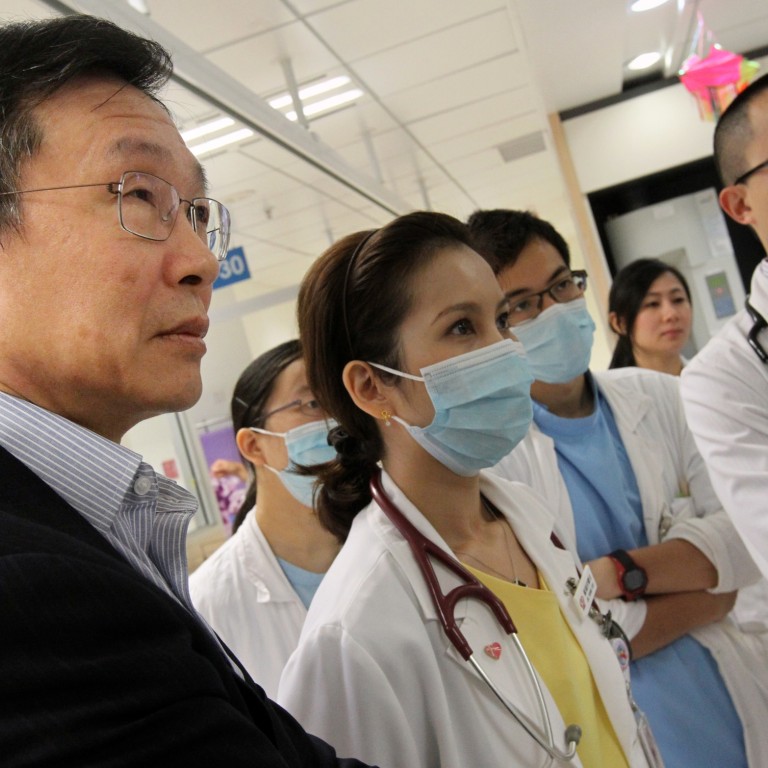
Waive vetting test for overseas-trained Hong Kong doctors
Albert Cheng says waiving the controversial vetting exam for them can not only help our ageing society, but also protect doctors' interests
The Steering Committee on Population Policy recently issued a consultation document to consider ways to raise Hong Kong's fertility rate and increase its labour force, to tackle problems associated with an ageing population.
The document has been criticised for giving only policy directions but proposing no concrete measures. One reason may be because the public has so little trust in the government.
Having local knowledge is certainly helpful, but making it compulsory as part of an entry exam to screen candidates is unreasonable
Legislative Council president Jasper Tsang Yok-sing has warned of the risks of the "Tacitus Trap", in which a government is perceived to be lying even when it is telling the truth. Our government may well have fallen into this trap.
Given its bad record in policymaking, it has only itself to blame.
Take public health care as an example. The shortage of public doctors has led to an overstretched health system and medical blunders in public hospitals.
The government knows well the urgency of the matter and that we can allow qualified overseas doctors to work here in order to relieve the manpower pressures.
Yet, at the same time, it allows the Medical Council to obstruct the recruitment of overseas doctors by requiring them to pass a vetting exam. This screening measure applies to doctors who have been trained overseas.
This is a protectionist measure that goes against the spirit advocated by the government's population consultation document, which calls for an open mind to the importation of talent.
The only explanation I can think of is that the medical sector has long been monopolised by doctors who graduated from the two university medical schools here. We have to ask: are they putting their own interests above public interests?
In today's Hong Kong, doctors are part of society's elite. But unlike other professionals, like in accountancy and the law, they have not become more open to foreign talent.
The requirement of a vetting exam for experienced doctors is unreasonable because these tests are more suited for newly qualified doctors.
Doctors who have been out of medical school for some time are no longer familiar with the current syllabus, though they may have a lot of practical experience. Imposing these tests on them is unfair.
It's no different from forcing PhD students to take the Hong Kong Diploma of Secondary Education Examination; they would most likely fail.
Requiring medical specialists to take exams for the sake of taking them is nothing but a waste of time and energy.
Also, these exams require students to have local knowledge that has little to do with medical expertise, such as what emergency numbers to call in dire situations. How can we expect people new to the city to know such things at the outset?
What is more important is their expertise, knowledge and skills.
To be honest, being qualified overseas is often the next step of advancement for local doctors, which goes to show that overseas standards are highly regarded in local medical circles. It is absurd, then, to imply that an overseas-trained doctor can't measure up here.
I believe we can both solve the problem of manpower shortages in public hospitals and at the same time protect the basic interests of local doctors.
We should take a moderate approach by first recruiting locals who have graduated from overseas medical schools. This is a sensible and reasonable move.
Local medical schools, such as the University of Hong Kong Li Ka Shing Faculty of Medicine, have limited places for qualified locals to study, so many students who could have trained here end up studying overseas.
In order to protect the interests of local private doctors, we could restrict returning locals to work in public hospitals for three years first before they can start private practice.
This way, we would prevent a sudden influx of doctors, which would create unhealthy competition.
Having local knowledge is certainly helpful, but making it compulsory as part of an entry exam to screen candidates is unreasonable.
The Hospital Authority could require overseas-trained doctors to take a familiarisation course before returning to Hong Kong. This could either be done online as a distance-learning course or at either one of the university medical schools here upon their return.
This approach would safeguard public interests while providing a level playing field for all. This is certainly a win-win approach for all parties concerned.
We are a metropolitan city. We don't have natural resources, and our most precious resource is human capital, thanks to our open economy and a system that embraces and cherishes talent.
To maintain our growth and prosperity, we must embrace diversity and maintain an open mind.

